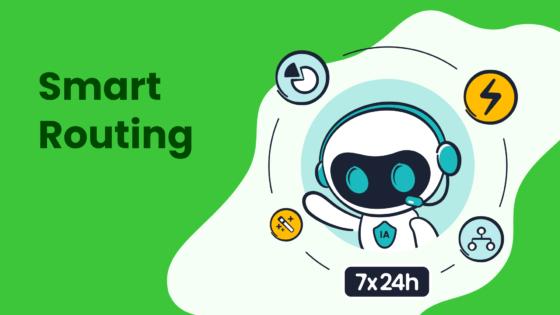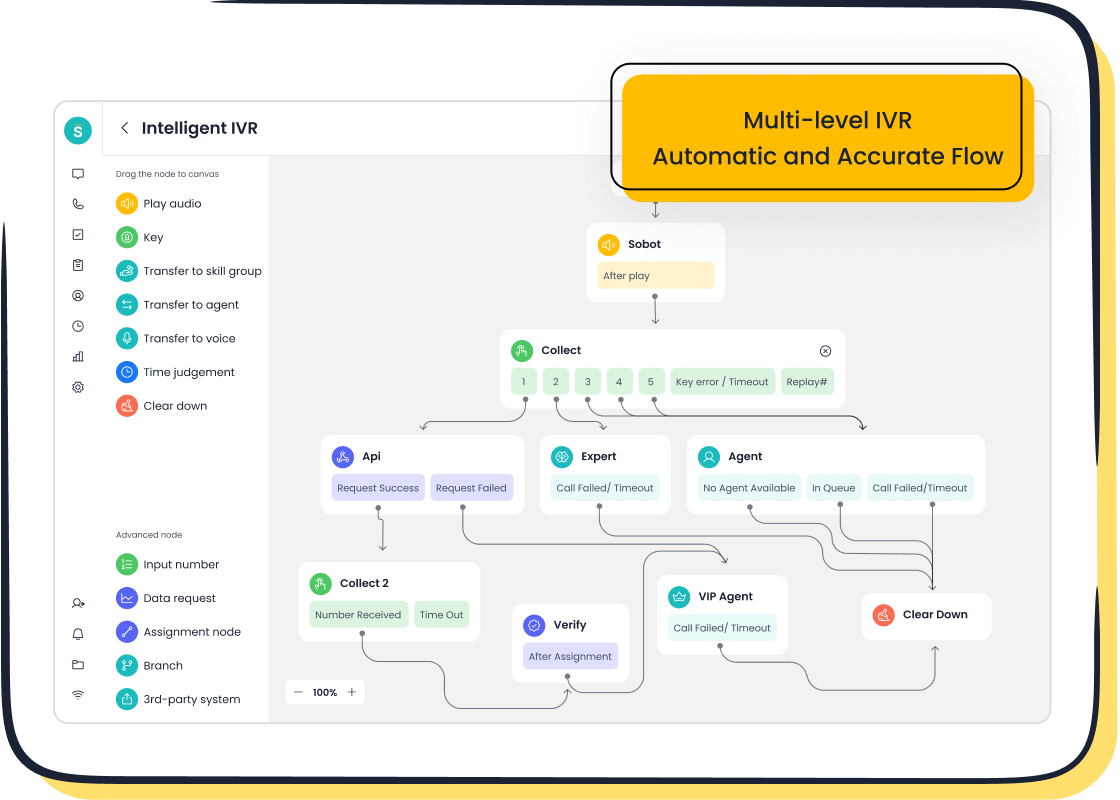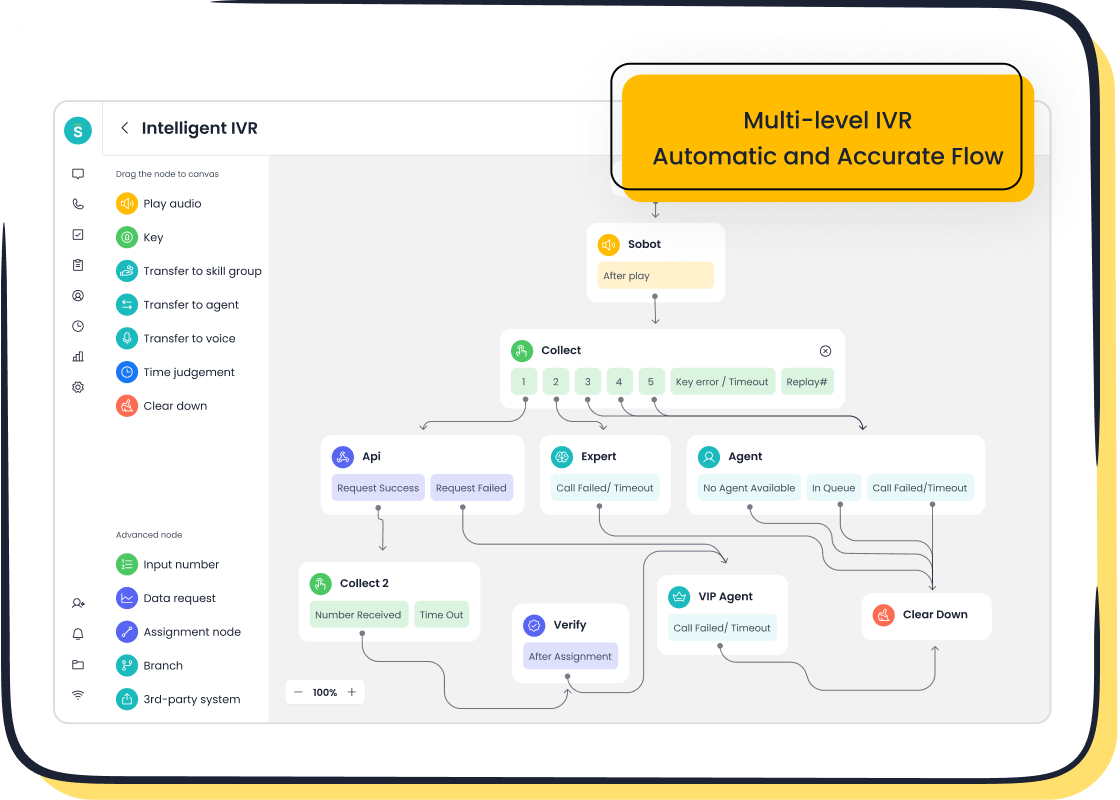Cloud Contact Center Benefits Explained for 2025

Cloud contact center benefits in 2025 include rapid adoption, advanced AI, and seamless omnichannel support. The global CCaaS market will reach $7.9 billion, reflecting strong demand for efficient solutions.
| Year | Global CCaaS Market Revenue (USD Billion) |
|---|---|
| 2022 | 4.7 |
| 2023 | 5.5 |
| 2024 | 6.4 |
| 2025 | 7.9 |
Sobot AI transforms customer service by using chatbots and voice assistants for 24/7 support. Sobot call center features enable better customer experience, higher productivity, and real benefits for customers.
Cloud Contact Center Overview

What Is a Cloud Contact Center?
A cloud contact center is a digital platform that manages customer interactions across multiple channels, including phone, email, chat, and social media. Leading industry analysts identify several core features that define a modern cloud contact center:
- Omnichannel support for unified customer management.
- Advanced routing algorithms, such as skills-based and time-based routing.
- Real-time reporting and analytics for performance tracking.
- Interactive Voice Response (IVR) for automated self-service.
- Call recording and monitoring for quality assurance.
- Seamless integrations with CRM, ERP, and business tools.
- Multi-device and remote access for agents.
- AI-driven features like sentiment analysis and workflow automation.
Cloud contact center solutions use AI, machine learning, and natural language processing to improve customer satisfaction and reduce call volume. These platforms offer high reliability, with uptime rates reaching 99.99%, network redundancy, and enhanced security features. Sobot’s unified platform exemplifies these capabilities, providing businesses with a stable, scalable, and secure environment for customer engagement. Learn more about Sobot.
Cloud vs. On-Premise
| Aspect | Cloud Contact Centers | On-Premise Contact Centers |
|---|---|---|
| Cost | Lower upfront costs; subscription-based pricing; pay-as-you-go model | High upfront investment in hardware, licenses, and IT staff |
| Scalability | Instant expansion of users/agents; flexible upgrades; global availability | Complex IT upgrades; slower to scale |
| Innovation | Automatic updates; easy integrations with CRM and AI tools; real-time analytics | Limited integration; slower updates |
Cloud contact center solutions deliver cost efficiency, rapid scalability, and continuous innovation. Businesses can expand their teams instantly and integrate new technologies without major investments. Cloud-based contact center platforms also support remote work, enabling agents to operate from any location.
Sobot’s All-in-One Approach

Sobot’s cloud contact center integrates smart features such as chatbot, live chat, voice tools, ticketing, and automation into a single omnichannel system. AI agents respond quickly, understand customer needs, and operate 24/7. The platform supports real-time transcription, sentiment analysis, and automatic ticket generation, boosting agent productivity. Sobot’s omnichannel support allows businesses to manage calls, chats, emails, and social media in one workspace. Seamless integration with platforms like Shopify and Amazon saves time and improves customer service. Sobot’s cloud-based contact center offers secure data storage, end-to-end encryption, and compliance with global standards. The clean interface and simple setup accelerate adoption, while stable performance ensures reliability for teams of any size.
Key Benefits of Cloud Contact Centers
Cloud contact center benefits have transformed how organizations deliver customer service in 2025. Businesses now expect platforms that offer seamless scalability, cost-effective solutions, and rapid integration with essential business tools. Sobot’s cloud call center exemplifies these advancements, providing a robust foundation for growth and operational excellence.
Scalability and Flexibility
Scalability for fast-paced growth stands as one of the most important cloud contact center benefits. Companies can quickly scale their operations up or down to match seasonal peaks, promotional events, or unexpected surges in customer inquiries. This seamless scalability eliminates the need for costly physical infrastructure and allows organizations to add or remove agents with just a few clicks.
- Businesses can expand or contract their workforce instantly, supporting remote and hybrid work arrangements.
- Cloud call center platforms break down geographical barriers, enabling multi-region and multi-time zone operations.
- Organizations benefit from secure, off-site hosting, which allows agents to access the system from anywhere, ensuring business continuity even during disruptions.
Sobot’s cloud-based contact center supports global number availability and time zone management, making it easy for teams to serve customers worldwide. For example, during major shopping festivals, retail brands using Sobot’s cloud call center can onboard hundreds of temporary agents in minutes, then scale back after the event ends. This flexibility helps companies maintain high service quality without overinvesting in permanent resources.
Tip: Flexible cloud solutions empower organizations to respond to changing customer needs, ensuring uninterrupted service and improved employee satisfaction.
Cost Efficiency
Long-term cost efficiency is a core advantage of cloud contact center benefits. Traditional on-premise systems require significant upfront investments in hardware, licenses, and IT staff. In contrast, cloud-based contact centers operate on a subscription or pay-as-you-go model, reducing capital expenditures and shifting costs to predictable operational expenses.
- Cloud call center platforms reduce overhead by eliminating the need for physical infrastructure and on-site maintenance.
- Automation and AI features, such as Sobot’s intelligent IVR and voicebot, handle routine inquiries and reduce agent workload, leading to lower labor costs.
- Companies only pay for the services they use, avoiding underutilized hardware and unnecessary expenses.
| Pricing Model | How It Works | Pros | Impact on TCO and Business Needs |
|---|---|---|---|
| Per-Minute Pricing | Charges based on call duration | Pay for actual usage; suits fluctuating calls | Good for unpredictable volumes; TCO varies with call length |
| Per-Call Pricing | Fixed rate per call regardless of duration | Simple, predictable costs; encourages efficiency | Predictable TCO for consistent call lengths |
| Per-Agent Pricing | Fixed fee per agent monthly/annually | Predictable costs; encourages quality service | Stable TCO; supports quality but may increase costs if volume drops |
| Hybrid Pricing | Combines models (e.g., base per-agent + per-minute) | Flexible; balances cost control and scalability | Supports growth and cost optimization; TCO depends on usage mix |
Sobot’s cloud call center offers an economic SaaS rental model, making advanced features accessible to businesses of all sizes. Opay, a leading financial service platform, reduced its operational costs by over 20% after switching to Sobot’s omnichannel solution. The ability to scale resources on demand and leverage automation helped Opay achieve a 17% increase in conversion rates while maintaining a 90% customer satisfaction score.
Note: Cloud contact center benefits include the ability to reduce costs while maintaining high service standards, supporting both short-term savings and long-term growth.
Fast Deployment and Integration
Speed and simplicity in deployment set cloud-based contact centers apart from traditional systems. Organizations can launch a new cloud call center in days, not months, and start serving customers almost immediately. Sobot’s platform features a drag-and-drop IVR builder, unified workspace, and real-time analytics, allowing teams to configure workflows and monitor performance with ease.
Integration with CRM and business tools is another key benefit of cloud contact centers. Sobot’s cloud call center connects seamlessly with popular platforms like Salesforce, Shopify, and Amazon, enabling agents to access customer data, interaction history, and tickets in one place. This unified view improves agent productivity and ensures a consistent customer experience across all channels.
Cloud contact centers provide pre-built adapters and open APIs for custom integrations, supporting features such as automatic call logging, real-time data updates, and workflow automation. These capabilities help organizations break down data silos, streamline communication, and make data-driven decisions.
For example, Sobot’s integration with Opay’s email and social media channels allowed the company to manage all customer inquiries from a single dashboard. The result was faster response times, improved agent efficiency, and a significant boost in customer satisfaction.
Pro Tip: Fast deployment and easy integration with business tools enable organizations to adapt quickly to market changes and deliver superior customer experiences.
Omnichannel and AI Features

Unified Customer Interactions
Modern cloud-based contact center platforms unify customer journeys across channels, preserving context and conversation history. Companies have shifted rapidly to cloud contact center solutions, with adoption rising from 15% in 2015 to over 75% in 2023. This shift enables seamless omnichannel customer support, allowing customers to interact through voice, chat, email, and social media without losing information. Aberdeen Group’s 2023 research found that businesses with strong omnichannel engagement retain 89% of customers, compared to only 33% for those with weak engagement. Unified platforms consolidate tools and data, improving agent efficiency and reducing training time. Customers benefit from consistent, personalized service, and agents resolve issues faster.
- Omnichannel contact centers preserve context, so customers never repeat information.
- Advanced routing and AI integration speed up issue resolution and increase satisfaction.
- Unified workspaces support remote agents and flexible operations.
Companies in retail, healthcare, and financial services report reduced wait times and improved compliance using unified cloud-based contact center platforms.
AI and Automation
AI and automation drive operational efficiency in cloud contact center solutions. Robotic Process Automation (RPA) handles routine tasks like data entry and call routing, freeing agents for complex issues. AI-powered forecasting and scheduling optimize staffing and maintain service levels. Enhanced self-service options, such as chatbots and IVR, provide efficient customer interactions and reduce agent workload.
| Feature | How it Improves Operational Efficiency |
|---|---|
| AI-driven Intelligent Routing | Matches customers to best agents, increasing first contact resolution and reducing repeat contacts. |
| Performance Analytics | Supervisors gain real-time visibility into KPIs, enabling data-driven optimization. |
| Workforce Management | AI forecasts and schedules resources, reducing costs and maintaining service levels. |
| Cloud-Based Agility | Rapid onboarding and instant updates increase flexibility and reduce complexity. |
Real-time agent assist tools suggest responses and surface relevant knowledge, boosting productivity. Generative AI personalizes interactions, reduces wait times, and supports seamless omnichannel experiences.
Sobot Omnichannel Solution
Sobot’s omnichannel solution integrates multiple customer touchpoints, including social media, e-commerce platforms, apps, emails, and SMS. Advanced AI capabilities power scenario-based automation, multi-faceted AI agents, and secure data management. Service features include chatbots, automated routing, IVR, call recording, real-time analytics, and proactive marketing. Customer service teams benefit from improved efficiency, faster response times, and personalized communication.
Opay, a leading financial service platform, adopted Sobot’s solution to manage customer interactions across channels. The unified system helped Opay increase customer satisfaction from 60% to 90%, reduce costs by 20%, and boost conversion rates by 17%. Sobot’s platform enabled Opay to deliver consistent customer experience and efficient support, demonstrating the value of cloud-based contact center technology.
Sobot’s omnichannel customer support empowers businesses to engage customers proactively, automate workflows, and make data-driven decisions for better customer engagement.
Security, Reliability, and Remote Work
Data Security and Compliance
Cloud contact centers must meet strict security and compliance standards to protect sensitive customer data. Sobot’s platform follows leading frameworks such as PCI DSS, ISO 27001, and GDPR. These standards require secure networks, access controls, and continuous monitoring. Sobot also supports HIPAA and CCPA, ensuring privacy for healthcare and California residents. The platform uses encrypted data transfer and local data hosting to meet global regulations. Automation and AI help streamline compliance tasks, such as data discovery and reporting. Sobot’s robust data governance framework includes lifecycle management, access controls, and real-time auditing. This approach builds trust and supports business continuity for organizations in regulated industries.
- PCI DSS: Protects cardholder data with secure networks and monitoring.
- ISO 27001: Ensures information security management.
- GDPR and CCPA: Enforce strong privacy controls and data rights.
High Uptime and Global Reach
Sobot delivers 99.99% uptime, supported by a global network with 110 points of presence in 93 cities across 50 countries. Geo-redundant infrastructure reduces downtime and ensures service continuity during local outages. Cloud-based management shifts infrastructure responsibility to Sobot, allowing businesses to focus on customer service. High uptime and global reach enable agents to serve customers in any region, supporting business continuity even during peak demand or unexpected disruptions. Sobot’s mobile compatibility allows agents to connect from Android or iOS devices, maintaining productivity wherever they work.
| Aspect | On-Premise Contact Centers | Sobot Cloud Contact Center |
|---|---|---|
| Uptime | Prone to local outages | 99.99% uptime, geo-redundant |
| Global Reach | Limited by physical infrastructure | 110+ global locations, mobile access |
Supporting Remote Teams
Remote work has become the standard for many contact centers. Sobot’s cloud platform empowers agents to work from any location and device. Integrated collaboration tools, such as real-time monitoring and live transcription, help supervisors manage distributed teams. Omnichannel support allows agents to handle calls, chats, and emails from a single dashboard. Advanced routing and AI-powered virtual agents ensure efficient customer service. Security features like multi-factor authentication and encrypted communication protect remote interactions. Sobot’s workforce optimization tools help forecast call volumes and schedule agents, supporting business continuity and operational efficiency. By enabling seamless remote work, Sobot ensures organizations can maintain high-quality service and adapt quickly to change.
Better Customer Experience and Business Outcomes
Improved Satisfaction and Loyalty
Cloud contact center platforms have changed how businesses interact with customers. These solutions unify communication channels, allowing customers to reach support through voice, email, chat, or social media. Agents use advanced analytics to understand customer behavior and preferences. This approach creates personalized interactions and makes customers feel valued. Real-time analytics help businesses monitor service quality and adjust quickly. Integration with CRM systems gives agents access to customer histories, which leads to faster and more efficient support.
Companies using cloud contact center technology report higher Net Promoter Scores (NPS) and stronger customer retention. Reliable service and quick issue resolution build trust. Customers who receive consistent and convenient support are more likely to stay loyal and recommend the brand. Sobot’s cloud call center helped Opay increase customer satisfaction from 60% to 90%. Opay also saw a 17% rise in conversion rates and a 20% reduction in costs after adopting Sobot’s omnichannel solution.
Businesses that invest in cloud contact center solutions see rapid improvements in customer experience, satisfaction, and loyalty.
Enhanced Productivity
Cloud call center platforms boost productivity for agents and teams. Agents can access the system from anywhere with an internet connection and headset. Automation handles repetitive tasks, such as call routing and after-call work. AI-powered chatbots manage routine inquiries, freeing agents to focus on complex issues. Self-service options let customers resolve problems independently, saving time for both parties.
- Automation of tasks and AI chatbots increase agent productivity.
- Remote work options improve employee satisfaction and engagement.
- Integration with CRM systems streamlines workflows and improves data access.
- Scalability allows businesses to adjust workforce capacity as needed.
- AI-driven routing and predictive analytics optimize agent performance.
Cloud contact center solutions also reduce infrastructure and maintenance costs. Businesses can allocate resources to higher-value activities, improving overall return on investment.
Real Results with Sobot
Sobot’s cloud contact center delivers measurable business outcomes. Companies like Klarna reduced costs by 40%. Motel Rocks deflected 43% of tickets. General users achieved customer satisfaction rates up to 95%. During peak times, businesses handled 2.5 times more inquiries. Sobot’s AI chatbots resolve up to 70% of routine queries, improving satisfaction by 30%. Omnichannel strategies supported by Sobot led to a 91% increase in customer retention year-over-year.
| Customer | Result Achieved | Metric/Percentage |
|---|---|---|
| Opay | Customer satisfaction rate | 90% |
| Klarna | Cost reduction | 40% |
| Motel Rocks | Ticket deflection | 43% |
| General users | Customer satisfaction rate | Up to 95% |
| General users | Increase in inquiry handling | 2.5× during peak times |
Sobot’s cloud call center and omnichannel solutions help customers achieve better customer experience, higher NPS, and strong business growth.
Cloud contact centers deliver unmatched scalability, cost efficiency, and AI-driven support. Sobot stands out with secure omnichannel integration, advanced analytics, and global reliability. Businesses can retire outdated systems, streamline operations, and measure ROI through cost savings and improved customer experience.
To explore future-ready solutions, visit Sobot’s website, review the AI Solution page, or request a demo for tailored guidance.
FAQ
What are the main cloud contact center benefits in 2025?
Cloud contact center benefits include scalability, cost efficiency, fast deployment, omnichannel support, and advanced AI features. Sobot’s platform helps businesses improve customer satisfaction, reduce costs, and streamline operations.
How does Sobot ensure data security and compliance?
Sobot uses encrypted data transfer, follows global standards like PCI DSS and GDPR, and provides real-time auditing. The platform protects sensitive information and supports compliance for industries such as finance and healthcare.
Can Sobot’s cloud contact center integrate with existing business tools?
Sobot offers seamless integration with CRM systems, e-commerce platforms, and business tools. The platform supports Salesforce, Shopify, and Amazon, enabling agents to access customer data and manage interactions efficiently.
How does Sobot support remote teams and global operations?
Sobot’s cloud contact center benefits remote teams with mobile compatibility and a unified workspace. Agents can work from anywhere, and the platform’s global network ensures reliable service across regions and time zones.
What impact do AI and automation have on customer experience?
AI and automation in Sobot’s cloud contact center improve response times, personalize interactions, and handle routine inquiries. These features boost agent productivity and help businesses deliver consistent, high-quality customer service.
See Also
Best Cloud Contact Center Services Evaluated For 2024
Revealing Leading Cloud Contact Centers For 2025
2024's Best Contact Center Solutions Thoroughly Reviewed
